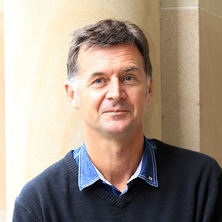Food scarcity and intellectual property
The intellectual property law expert collaborating to combat food scarcity
 Give a person bread and you feed them for a day. Navigate intellectual property law to grant them easy access to seed, grain and genetic material to grow crops, and you feed them for a lifetime.
Give a person bread and you feed them for a day. Navigate intellectual property law to grant them easy access to seed, grain and genetic material to grow crops, and you feed them for a lifetime.
Professor Brad Sherman is a secret ingredient in the global food chain.
The internationally revered researcher applies his legal expertise to projects that use intellectual property law to improve agricultural productivity and food security.
IP and the food chain
Intellectual property drives all stages of the food chain: from patenting genetic material and seeds to transporting, marketing and consuming goods, all while navigating different regulatory regimes.
“Over the past 20 years, there have been a number of changes to the rules that govern access to plants and genetic resources,” Professor Sherman says, singling out the 1993 Convention on Biological Diversity (CBD) and subsequent Nagoya Protocol in 2010.
Aiming for diversity, sustainability and benefit sharing
Both aim to conserve biological diversity, ensure sustainability and share any benefits, but there is global inconsistency across their interpretation and adoption.
“These international legal arrangements have been poorly implemented in Australia and elsewhere. They’re having a negative impact on people’s ability to access the genetic material that’s needed for breeding new crops that are essential for dealing with climate change, a growing population and changing land use,” he says.
“In trying to develop a solution to this problem, I’m working with other researchers, universities, Australian botanic gardens and seed banks across Australia to help provide better access to genetic material for food growers and agribusiness.”
Domestic and international focus
Professor Sherman is tackling the problem in two stages – the first with a domestic focus, and the second in collaboration with the Global Plant Council and DivSeek International Network – which comprises plant breeders, scientists and academics, as well as other organisations around the world to develop a global approach.
“My focus is still solving the Australian leg of this problem, but these international partnerships are going to be crucial for the next stage, absolutely essential.”
Nationally, Professor Sherman was awarded a prestigious Australian Research Council (ARC) Laureate Fellowship in 2015 to spearhead Harnessing Intellectual Property to Build Food Security. The project uses intellectual property protection to improve food production and security in Australia and the Asia Pacific.
His collaborative relationships also led to his appointment as Lead Chief Investigator for two ARC Centres of Excellence: Plant Success in Nature and Agriculture, based at UQ, and Synthetic Biology, administered through Macquarie University.
“I’m privileged to partner with researchers, government and industry across the world, including several US museums to help ensure ongoing access to historical plant collections,” he says. It’s vital that researchers connect internationally to knowledge-share and collaborate.”
For the past decade, Professor Sherman has also served as Australia’s representative to the United Nations’ Food and Agriculture Organisation (FAO).
Contact us at research@law.uq.edu.au to find out how you can work with experts like Brad on food security
Discover more about how we can partner together to find solutions to the issues important to you and your organisation.
UQ Law research
Connect with our researchers
Collaborate with us to solve today's pressing challenges. Find out how we can work together.
Find a researcher by name
Find researchers by research area
Research themes & challenges
Potential HDR projects
Summer/Winter research scholarships
What's on
Research groups
Australian Centre for Private Law
Centre for Public, International and Comparative Law
Food Security and Intellectual Property
Indigenous People and the Law
Law and the Future of War
Law and Religion in the Asia-Pacific
Law, Science and Technology
Marine and Shipping Law Unit
UQ Solomon Islands Partnership
